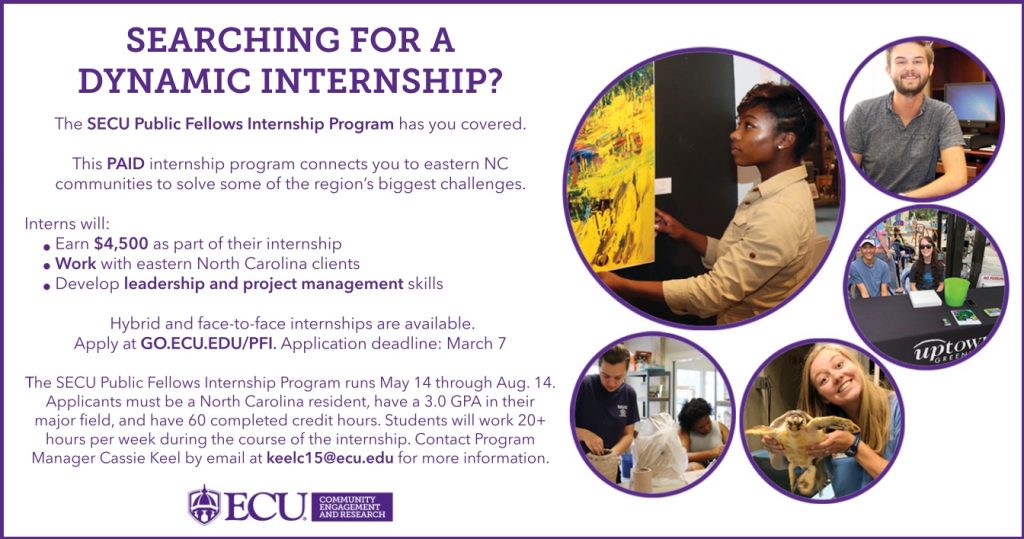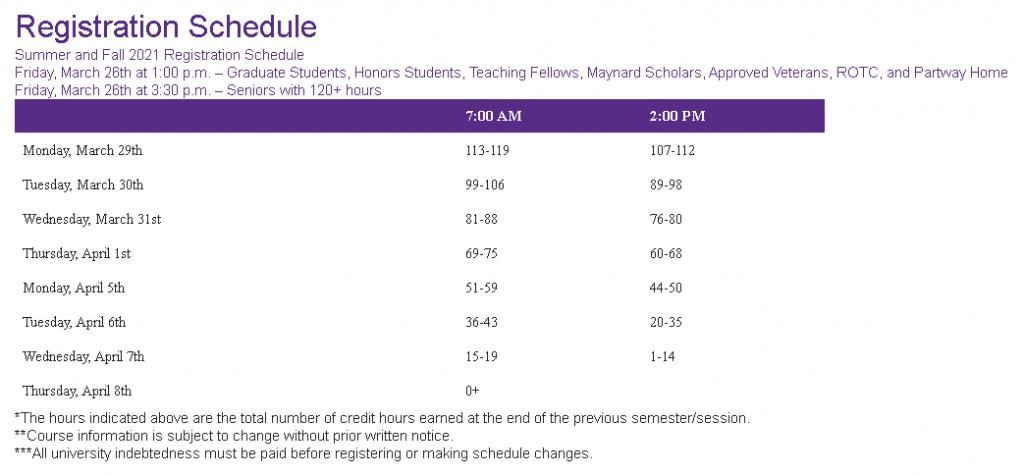
Uncategorized
The Department of Political Science Welcomes New Chancellor, Dr. Philip Rogers
Dr. Philip Rogers became East Carolina University’s 12th chancellor on March 15, 2021. We welcome him and wish him the best as he embarks on his stewardship of ECU.
On a related note, many thanks to Dr. Ron Mitchelson, whose steady hand has so ably guided us for the past year.
Center for Survey Research: Health Activities and Beliefs in Eastern NC
Jay Morris and Peter Francia, in collaboration with researchers from the Vidant Medical Center, conducted a survey of the public’s health activities and beliefs in Eastern North Carolina. The project was funded by CARES Act of 2020.
Summer & Fall Registration Calendar Information
Early registration – for special categories – begins on Friday, March 26.
For most students registration begins Monday, March 29.
When you register depends on the number of credit hours you have completed PRIOR to this semester: The number of COMPLETED HOURS, as of December 2020.
You can find number this by checking DegreeWorks. The number you are looking for is the “overall credits,” listed below your minor (in the right hand column, at the top). Do NOT use the “credits applied” – this number includes the classes you are currently enrolled in.
See below:

More information is available from your adviser.
A Blast from the Past: The Boys, August, 2004
August, 2004, Drs. Morris and Baumgartner, starting their 2nd year at ECU. and Dr. Francia, starting his first year. The occasion: A discussion of Bill Clinton’s My Life, at Barnes & Noble.
My, but we were once younger…

Spring 2021 Semester: Class Withdrawal & Pass-Fail Policies
For those that did not notice, the university announced the policies governing class withdrawal and pass-fail options for the spring 2021 semester. These policies have been amended from the standard policies to account for Covid-19 related difficulties, and are as follows:
PASS-FAIL: Students can opt for Pass/Fail grading for a maximum of 2 classes. As has been the case in previous semesters, this will be done after your final grades have been entered (between 11 May at 8 a.m. and 26 May at 8 a.m.).
CLASS WITHDRAWAL: Students can withdraw from classes until April 27.
Students are encouraged to talk to their advisor and financial aid before electing to withdraw from any classes or take the Pass/Fail option, as either could impact future eligibility for aid.
Dr. Olson Lounsberry To Continue On the Editorial Board of the Journal International Interactions
Dr. Marie Olson Lounsberry has agreed to a second two-year term on the Editorial Board for the journal International Interactions. The journal “publishes research on international relations and conflict causation, management and resolution, including civil wars and terrorism.”
New Publication for Dr. Francia: “The White Working Class, Union Households, and Trade: Did the Trump Coalition Endure?”
Dr. Francia recently published a paper titled “The White Working Class, Union Households, and Trade: Did the Trump Coalition Endure?”
Abstract: Donald Trump’s victory in the 2016 presidential election caught many political experts by surprise. Looking to uncover the reasons for this unexpected outcome, social scientists presented several explanations in the election’s aftermath. In this article, I discuss one of these explanations: Trump’s success in winning white working-class voters by an overwhelming margin. I also discuss his success in narrowing the advantage that Democratic presidential candidates typically enjoy with voters in union households. Using data from the 2012 and 2016 National Election Pool (NEP), and the 2016 Cooperative Congressional Election Study (CCES), the results in this work show that Donald Trump won the support of white working-class voters and was competitive with voters in union households. By expanding previous Republican margins with white working-class voters and by narrowing the Democrats’ typical union household advantage, Trump secured himself victories in Pennsylvania, Michigan, and Wisconsin, which ultimately won him the election. Four years later, exit polls indicated that Trump’s support among these groups in the 2020 election was still strong but somewhat diminished.
See: https://link.springer.com/article/10.1007/s12115-020-00553-9
The CA Governor Newsom Recall Initiative: How Likely Is A Recall?
The Basics Explained: The CA Governor Newsom Recall Initiative
So far, the campaign to recall CA Governor Newsom is on track to get “the signatures they need by a deadline of 17 March.[2] “To qualify the recall effort for the 2020 ballot, petitioners must collect 1,495,709 valid signatures, which is equivalent to 12% of the 12,464,235 votes cast in the last election for governor.[1]
If their efforts succeed, a recall election could be held before the end of the year…. It’s still extremely unlikely that a majority of Californians would choose to oust Newsom. State records show almost every California governor since 1960 has faced recall efforts, but only one – Gray Davis in 2003 – has been successfully removed”[2].
But “recalling a governor isn’t easy…. In California, since the recall got put into place back in 1911, there have been 49 efforts to recall a governor… Of that number, only one actually qualified and succeeded — and that was the only against Gray Davis back in 2003.”[1]
[1] https://www.theguardian.com/us-news/2021/mar/01/gavin-newsom-california-push-recall.
[2] https://www.cnn.com/2021/02/21/politics/newsom-california-recall-signatures/index.html.
Spotlight on ECU Political Science Alumni: Dennis Cherry
Recent ECU graduate Dennis Cherry is in first year of graduate school in Political Science at George Washington University. Dennis is not only doing well, but he made honor grades in first semester.
Congratulations Dennis!